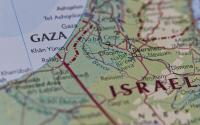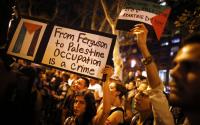by Phyllis Bennis; September 22, 2003
Still committed to its war drive in Iraq, Washington stands more isolated than ever. Its trade aims were defeated at the World Trade Organization in Cancun. It faces international outrage following its veto of the mildly-worded Security Council resolution challenging Israel's threat to expel or assassinate Yasir Arafat. In response, the General Assembly overwhelming passed a resolution virtually identical to that Washington vetoed in the Council. Like the Security Council's "Uncommitted Six" (Angola, Cameroon, Chile, Guinea, Mexico, Pakistan), which stood defiant and refused to endorse Bush's war in Iraq, the emergence of the Group of 21 developing countries at the WTO proved once again that resistance to empire is possible within the international community. Led by Brazil, Argentina, South Africa and India, the Global South's negotiators in the suites were backed by the power of global protesters in the streets -- and together they made Cancun a model particularly relevant as Washington returns to the United Nations to try to coerce the world body into supporting its occupation of Iraq.
Increasingly on the defensive at home, the Bush administration finally is facing a long-delayed (and still hesitant) challenge from Democrats regarding the conduct of the war and how (not yet whether) the requested $87 billion for another year of military occupation should be spent. The public divisions that characterized the 2002 run-up to the war have begun to surface again. The most visible is renewal of a highly public spat between Secretary of Defense Rumsfeld and his former (and fired) Secretary of the Army, former Enron executive Thomas White, who called Rumsfeld's post-war planning "totally inadequate."
In response to the new pressures even Vice-President Cheney made a rare foray out of his undisclosed location to hit the Sunday morning television talk shows claiming that the war is going fine, that Iraq is just a step away from a flourishing market democracy, and that no adjustment is required in Washington's occupation strategy. He also stated with a straight face that war in Iraq is hitting the "geographic center" of the terrorists whose attacks began on September 11th. (It was enough of an embarrassment that Bush himself had to publicly distance himself from his influential vice-president, reminding the public that he never actually said the words that Iraq was responsible for 9/11…)
The usually pragmatic secretary of state weighed in too, with a high-profile and emotional new justification for the war - this one announced during a quick visit to the Kurdish town of Halabja, whose civilian population was devastated with poison gas during the Iran-Iraq war. That 1988 attack, Colin Powell claimed, provides "evidence of the existence and the use of weapons of mass destruction," and thus justifies the U.S. invasion and occupation fifteen years later. He agreed there should have been a more aggressive response from the Reagan administration (in which he served as National Security Adviser). He did not, of course, mention that the U.S. had been providing financial and military assistance to Iraq throughout the years of the war, despite public knowledge of Iraq's use of illegal chemical and biological weapons. That assistance included sales to Baghdad of the biological seed stock for anthrax, e-coli, botulism and other biological weapons, as well as the provision of satellite-based targeting information to increase the accuracy of chemical weapons (themselves provided by Washington's European allies).
Despite the rejection of their initial Council proposal, there is no indication yet that the Bush administration intends to respond to that international isolation with a serious shift away from its current effort to coerce the United Nations into providing military and financial assistance to its illegal occupation of Iraq. To the contrary, it appears Washington is still demanding that the Security Council endorse continuing U.S. control of the occupation, while calling for UN member states to participate in the occupation as part of a multilateral force established under U.S. command. Bush administration concessions will be limited to rhetorical feints designed to provide political cover for disparate governments unwilling or afraid to apply the lessons of Cancun and the Uncommitted Six, and instead are willing, whether eagerly or grudgingly, to appease the empire's hunger for power.
Led by strong resistance from France and Germany, the Council rejected the initial U.S. draft out of hand. Negotiations are continuing, although the Bush administration has now admitted there will almost certainly not be a decision before Bush speaks to the General Assembly on 23 September.
There are some indications of a shift from Secretary General Kofi Annan's earlier call for Council unity, which hinted at support for unity at virtually any price, even including Council endorsement of a war that violates the UN's own Charter. Annan remains sharply focused on the 19 August attack that killed his special envoy Sergio Vieira de Mello and 22 others and brought into sharp relief the impossibility of protecting UN humanitarian staff broadly perceived as backing the U.S. occupation. At the WTO meeting in Cancun he focused explicitly on the injustices of wealthy countries' trade policy, particularly subsidies, rather than choosing an ostensibly "even-handed" approach. And Annan has put the broad question of UN reform, including expansion of the Security Council, on top of his agenda. According to the New York Times, the UN's leadership is debating how to get "the freedom it needs to survive without being seen as either a lackey of the United States or an easily swattable gadfly." Annan has said that "radical" reforms of the UN are called for, and his General Assembly speech will likely include a call for such changes - not likely shifts in the interest of Washington's unilateralists.
But the Bush administration is growing desperate for international help, and while there is no sign of Washington giving way on the substance, dangers remain that other countries may give in. France and Germany in particular have been publicly silent over the last couple of weeks. They may have been engaged in behind-the-scenes efforts to gain leverage in pushing the Bush administration towards a greater UN role in Iraq. But while French President Jacques Chirac and German Chancellor Gerhard Schroeder met on 18 September and more or less reaffirmed their positions on Iraq, German officials said Berlin's real goal was to urge the French to be more conciliatory. Similarly, the three-nation mini-summit on 20 September grouped Chirac and Schroeder with Tony Blair in what was described as an effort to avoid a new confrontation over Iraq.
There are clear signs that the Bush administration is attempting to punish, or at least isolate Paris because of Chirac's commitment to replace the U.S. occupation with a short-term UN operation designed to return Iraq's sovereignty to Iraq. The campaign includes efforts to win German and Russian support against France; Condoleezza Rice was quoted as saying that U.S. strategy is to "ignore [Germany], reward [Russia], and punish [France]." Some of that campaign may be working. The BBC reported from the Berlin summit that "it seems the French are playing hardball while the Germans would like to kiss and make up." And although Chirac said disagreements with Britain remained, German Chancellor Schroeder announced that the three countries agreed on the need for a "significant role" for the UN, a significant step down from the "central" role Germany and France had earlier demanded.
There is no indication Bush will soften his tone in his General Assembly speech. ``He's not been willing to take half a loaf,' said a senior administration official. Under those circumstances, it is certainly possible that some members of the Security Council might be willing to cave in to U.S. pressure and agree to some version of Washington's resolution. Any resolution, however, would still have to win approval from Russia, Germany, and especially France. While some French officials have reportedly said that this time there is no chance that Paris would veto a U.S. draft, French Foreign Minister Dominique de Villepin said that "the eventual arrangements cannot just be the enlargement or adjustment of the current occupation forces. We have to install a real international force under a mandate of the United Nations Security Council." Even if the French are reluctant to go head to head with the U.S., de Villepin and Chirac have taken positions from which it will be politically difficult to back down.
But in the face of Washington's anti-French crusade it is doubtful that Blair, who fully supported Bush's war but is now politically embattled at home because of that support, would openly turn on his powerful Texas partner to join "Old Europe" in challenging the U.S. During the 20 September summit Blair indicated some willingness to accept some of Chirac's and Schroeder's concerns, hoping to reclaim a central position within Europe. The likely result will be acceptance of a compromise resolution heavy on face-saving for both sides.
In the end, such a compromise is dangerously likely to maintain the essence of Washington's original demands: that the Security Council endorse, and that UN member states be urged to provide money and troops to bolster Washington's occupation of Iraq under unchallenged U.S. command.
Bush's decision to return to the UN for military and financial assistance does not reflect any U.S. concern regarding the illegality of the occupation, the lack of legitimacy of the U.S. presence in Iraq, or the impact on Iraqis of Washington's abject failure to provide for even the minimal humanitarian needs of the population. Instead, it reflects a growing concern about how to deal with what the New York Times called the "high cost of occupation" for the U.S. in Iraq -- costs both in U.S. soldiers' lives and in dollars.
The high price in dollars is already being paid by U.S. taxpayers even as the administration submits a new request of $87 billion of which $65 billion is to cover U.S. fighting costs. Only $15 billion is budgeted for Iraq's reconstruction, plus $5 billion to rebuild Iraq's military under Pentagon tutelage. (Only $2 billion is budgeted for reconstruction of devastated Afghanistan.) The new request follows the $79 billion dollars released in April 2003, with current spending at just under $1 billion per week to sustain the U.S. military's occupation of Iraq. The beneficiaries are corporations close to the Bush administration, notably Halliburton and Bechtel, which are earning billions of dollars.
The high price in lives is being paid by U.S. troops, those staffing checkpoints with jittery trigger-fingers and those assigned to state-building duties for which they have no training. An even higher price is being paid by Iraqi translators and other Iraqis working with and for the U.S. occupation authorities, and by UN humanitarian staff who are perceived as working under or as part of the U.S. occupation structure. The highest price in lives, of course, is paid by Iraqi civilians. They are dying at U.S. occupation checkpoints and as "collateral damage" in armed attacks by U.S. troops, dying in more than 600 gunshot killings each month in an unprecedented crime wave, and dying as a result of the continuing lack of sufficient clean water, electricity, and medical care.
The U.S. wants a UN-endorsed multilateral military force to participate in the occupation force in Iraq. It would function as a separate, parallel force with a separate command structure, but the commander would be an American. U.S. officials make clear their intention that the multilateral force would operate under the Pentagon's strategic control, and Russia has indicated it would not oppose such a force being created under U.S. command. There is a history of this kind of U.S. control of UN peacekeeping operations through imposing a U.S. general or admiral as "UN commander." This was U.S. practice during the Clinton administration in Somalia, Haiti and elsewhere.
But what is unprecedented is that the plan does not envision Washington even pretending to share authority and decision-making with the UN itself or with the governments sending contingents of soldiers. And the proposal certainly rejects the French call for Washington to end its occupation and turn over full authority to the UN for a brief period to oversee a rapid (perhaps as short as one month) return to Iraqi independence and sovereignty.
A number of countries, facing intense U.S. pressure, might be prepared to send troops with a new UN resolution providing even a vague international imprimatur. Countries eager for Washington's largesse and/or for a place on the international stage are already sending token forces; Ulan Bataar's newspapers are gloating over Mongolia's tiny contingent of 200 troops. U.S. officials have actually described the possibility of a new UN resolution to provide "political cover" for governments wanting to participate but restrained by domestic public opposition. In the meantime, a number of countries are under fierce bilateral pressure from Washington to send significant numbers of troops to seriously bolster and/or replace some of the Pentagon's soldiers. They include Pakistan, Turkey and South Korea.
The new UN resolution also encourages other countries to contribute funds, as well as troops, to the U.S. occupation. A donors conference is scheduled for late October in Spain, a key U.S. ally. If a UN resolution is passed before that date with little acrimony in the Security Council, it is likely significant new amounts of financial support will be forthcoming.
The willingness of Security Council members to stand defiant of U.S. pressure will ultimately depend on public pressure brought to bear on those governments both at home and from global civil society, as well as on backing from other members of the United Nations. Brazil and Argentina could play a key role in backing new Chilean and Mexican resistance in the Council; South African support would be vital for Angola, Cameroon and Guinea to continue to stand up to Washington; the Organization of the Islamic Conference could provide key backing for Pakistan. At the end of the day, governments will have to be forced to learn the lesson of Cancun and of the 8 ½ month "defiance campaign" in the Security Council - the lesson that the governments of even poor countries can, if backed by a broad social movement, defy the world's new empire, and the sky will not fall down. And the lesson that in fact such defiance will again strengthen democracy in those countries willing to take the chance. And those are lessons only a mobilized global movement can teach.
So What Should Be Done?
1) We should oppose any new UN resolution aimed at providing more legitimacy for the U.S.-UK occupation of Iraq. The UN should not endorse, and countries should not send troops or funds, to maintain or strengthen or "internationalize" Washington's occupation. We should demand that the UN return to its earlier position in which for 8 ½ months the Council stood defiant of the Bush administration to defend its Charter mandate to "prevent the scourge of war." That period, in which the UN was part of the international mobilization for peace, represented the global organization's most "relevant" and most democratic moment.
2) Only after the U.S.-UK occupation has ended should the United Nations, including a UN-commanded multilateral peacekeeping force, return to Iraq. Their mandate should be for a very short and defined period, with the goal of assisting Iraq in reconstruction and overseeing election of a governing authority. The UN political leadership should vocally oppose the U.S. demand that the global organization return to Iraq under the authority of the U.S. occupation.
3) As belligerent powers who initiated the war, and as occupying powers, the U.S. and the UK are obligated to provide for the humanitarian needs of the Iraqi people. While their military occupation should be ended immediately, Washington and London remain obligated to pay the continuing costs of Iraq's reconstruction, including the bulk of the cost of UN humanitarian and peacekeeping deployments. The U.S. should immediately make public a realistic estimate for the full cost of reconstruction in Iraq. Washington should reverse the spending priorities of its $87 billion request from Congress, and turn over to full UN authority a starting grant of at least $75 billion (the initial amount spent on waging the war) for reconstruction in Iraq. The $15 billion (out of the $87 billion) requested by the Bush administration for Iraqi reconstruction is insufficient to meet Washington's obligations under international law. These funds should not come from ordinary taxpayers, but should be raised from an excess profits tax on corporations benefiting from the war and post-war privatization in Iraq, as well as from the Pentagon budget lines initially directed at continuing war in Iraq.
4) The General Assembly should reassert its power as the UN's most democratic agency to take an explicit position calling for an end to the U.S. occupation, and to request an advisory opinion from the International Court of Justice on the legality of "preemptive war." Such an effort will require international mobilization by global civil society demanding that the UN, and especially the General Assembly, play a central role in challenging the U.S. drive towards empire.
5) Real reform of the United Nations should return to the top of the global agenda. Those reforms include democratization (through expansion of the Security Council, ending the veto power, and expanding power of the General Assembly), transparency, and creation of an oversight agency to monitor the Security Council for violations of the UN Charter in its decisions. The U.S. should use this moment to reverse its longstanding opposition to the creation of a standing UN-controlled rapid-reaction military force, beginning with reconstituting the UN Charter-mandated Military Staff Committee.






